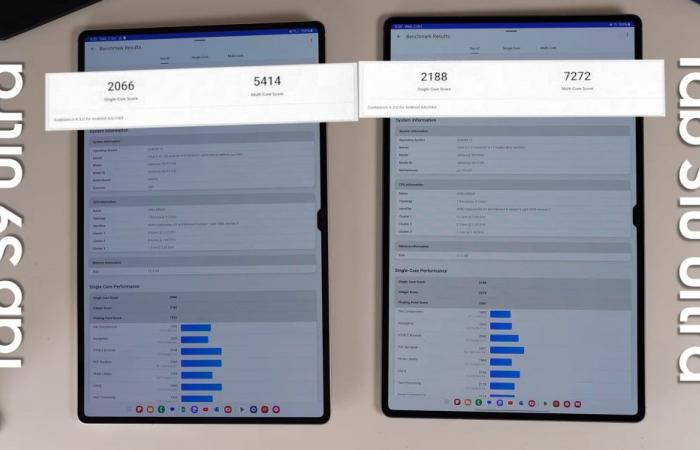
Samsung caused a sensation by launching the new Tab S10 Ultra and Tab S10 Plus launched the new Galaxy Tab S10 Ultra and Tab S10 Plus Samsung has completely removed the smallest Tab in the series, while abandoning the Qualcomm Snapdragon 8 Gen 3 for Galaxy at a variant of MediaTek’s Snapdragon 8 Gen 3 Dimensity 9300 SoC from MediaTek. While the Tab S10 series seemed to continue the impressive build quality and design precedent established by the Galaxy Tab S9 family, fans were rightly worried about the implications of the new MediaTek SoCs. At least some of those concerns have just been put to rest.
In a video test putting the two flagship tablets head to head, SamMobile revealed that in both synthetic benchmarks and real-world performance, MediaTek’s Dimensity 9300+ significantly outperforms Qualcomm’s Snapdragon 8 Gen 3 for Galaxy.
Samsung Galaxy Tab S9 vs. Tab S10 Résultats des tests CPU Geekbench :
- Galaxy Tab S10 Ultra Geekbench single-core : 2188 pts.
- Galaxy Tab S10 Ultra Geekbench multicore : 7272 pts.
- Galaxy Tab S9 Ultra Geekbench single-core : 2066 pts.
- Galaxy Tab S9 Ultra Geekbench multicore : 5414 pts.
Samsung Galaxy Tab S9 vs. Tab S10 Résultats des tests Geekbench GPU :
- Samsung Galaxy Tab S10 Ultra Geekbench Vulkan : 14681 (35.3% plus rapide)
- Samsung Galaxy Tab S10 Ultra Geekbench OpenCL : 12681 (24,7 % plus rapide)
- Samsung Galaxy Tab S9 Ultra Geekbench Vulkan : 9504
- Samsung Galaxy Tab S9 Ultra Geekbench OpenCL : 9553
From these results, it is clear that the Galaxy Tab S10 Ultra is around 25% faster than the last generation tablet in CPU tests and 24-35% faster in GPU tests, but it This is just one benchmark and is hardly representative of real-world performance.
To back up this performance, SamMobile also put the Galaxy Tabs through video editing, testing the same video clips and export settings in LumaFusion. Again, the Galaxy Tab S10 Ultra significantly outperformed the Tab S9 Ultra, finishing when the Tab S9 Ultra still had about 17% of the video clip to render.
As for efficiency, SamMobile monitored battery life during testing, observing the same 5% charge drop in both tablets, but this doesn’t give the full picture of efficiency. There were no thermal measurements or performance degradation during testing, and this is usually where a lot of mobile SoCs fall apart, even Qualcomm’s.
As for efficiency, SamMobile monitored battery life during testing and observed the same 5% charge drop in both tablets, but that doesn’t give the full picture of efficiency. No thermal or performance degradation measurements were made during testing, and this is usually where many mobile SoCs fall apart, even those in Qualcomm’s lineup.
Either way, it’s clear that comparisons between Qualcomm and its MediaTek competitors are no longer as one-sided as they once were – a change that can only be good for the mobile computing market as a whole.
You can buy the more affordable but equally large Samsung Galaxy Tab S10 Plus on Amazon for $999.99 or opt for a refreshed version of the latest generation Galaxy Tab S9 Ultra for $724.99.





